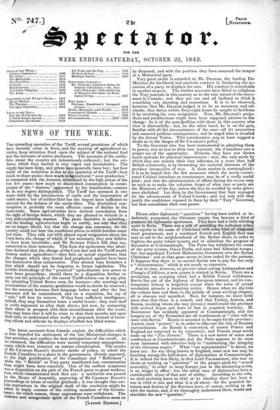NEWS OF THE WEEK.
THE spreading operation of the Tariff, several provisions of which have recently come in force, and the meeting of agricultural so- cieties, keep attention fixed upon the subject of the national food and the interests of native producers. The accounts of the cattle- fairs about the country are industriously collected ; but the evi- dence which they furnish is very vague and inconclusive. The supply has been large, and prices have generally been low ; but how much of the reduction is due to the operation of the Tariff—how much to sheer panic—bow much to agricultural " over-production " as compared with the demand, stimulated by the high prices of the last, few years—how much to diminished consumption in conse- quence of the " distress," aggravated by the insurrection—cannot be in any degree distinguished. The Tariff has operated in two ways—both by the introduction of cattle and the importation of cured meats; but of neither kind has the import been sufficient to account for the dulness of the cattle-fairs. The diminished con- sumption is probably the most efficient cause of decline in the meat-trade. Some agriculturists have derived consolation from the sight of foreign beasts, which they are pleased to ricicule in a very self-comforting manner. The panic therefore is subsiding ; and the leading agriculturists begin to certify, not only that they are no longer afraid, but that the change was necessary, for the country could not bear the exorbitant prices to which butcher-meat had risen. They talk too-With-almost equal resignation about the Corn-laws, the change of which; if not necessary, they now believe to have been inevitable ; and Sir ROBERT PEEL'S bill, they say, subserved to their interests. This from the spokesmen who afore- time declared that the change of the. Corn-law and the Tariff would destroy native agriculture I—they find, on actual experience, that the changes which they feared and prophesied against have been less destructive than conservative. This altered tone furnishes a hint which should not be forgotten in future legislation. The terrible forebodings of the " practical" agriculturists now prove to have been groundless : should there be a disposition further to carry out the principle of the recent Tariff-reform—as in any plan for admitting United States corn, for instance—the warnings and vaticinations of the country-gentlemen would no doubt be renewed ; but the contrast between their language before and after the late measures will be remembered, and on a repetition, the cry of " ruin" will lose its terrors. If they have sufficient intelligence, indeed, they may themselves learn a useful lesson : they were deaf to every argument to allay their alarm ; but now, by comparing their alarm in prospect with their reconcilement after the event, they may learn that it will be wiser to shut their mouths and open their ears, to understand what really is proposed, instead of incur- ring odium and ridicule by displays of selfish but blind terror.


























